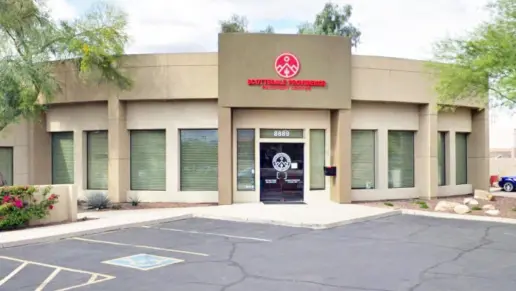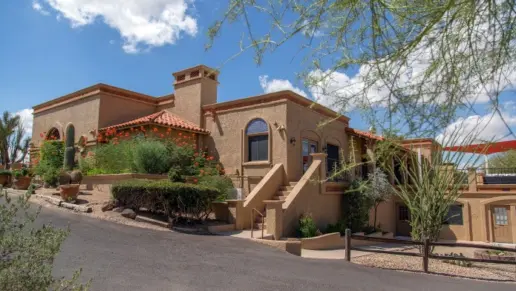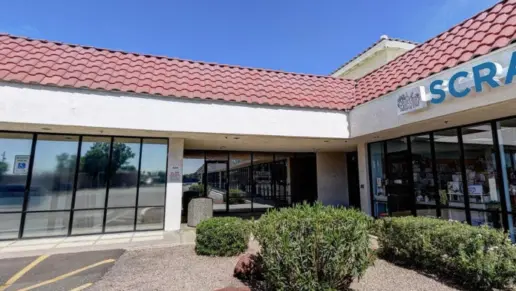Thanks to everyone at the IOP who helped me through my healing journey. The therapy they gave me was all according to my needs. Thank you a lot, I owe you so much! Sending all my love to you …
About The Meadows Outpatient Center, Scottsdale
In Scottsdale, Arizona, The Meadows Outpatient Center provides an intensive mental health and addiction program that emphasizes personalized care and holistic healing. They offer supportive accommodations for trauma recovery, addiction treatment and mental health care. Their programs provide holistic, evidence based treatments that treat the entire person instead of just treating the symptoms of a particular disorder.
For mental health programs, Meadows Outpatient Center offers a well rounded course of treatment for anyone facing depression, anxiety, PTSD or any other emotional hindrances. Their emphasis is on treating the trauma that often underlies these mental health disorders. In individual and group therapy, you’ll work with licensed counselors to examine past experiences, develop coping mechanisms and grow in healthier ways.
Integrative therapeutic strategies are their mainstay in treatment. They use cognitive behavioral therapy (CBT), EMDR (eye movement desensitization and reprocessing) as well as mindfulness practices to assist you in gaining better emotional regulation and insight. Family therapy is also available to give your family a chance to heal and recognize the importance of family dynamics and support in the healing process.
Their substance abuse disorder programs tackle the physiological, psychological and emotional effects of addiction. Dual diagnosis treatment will also address the addiction as well as any co-occurring mental health disorders. This treatment center has various phases of treatment to assist you through detox, counseling and ongoing support following completion. The recovery program is a combined effort of group therapy, individual counseling, and 12 Step support. It also includes yoga and methods such as paint therapy to offer treatment from all angles.
The Meadows Outpatient Center goes the extra mile when it comes to addressing trauma in its substance abuse programs. They recognize that many individuals who suffer from addiction have a trauma history that likely influenced their substance use, so they offer services such as somatic experiencing and psychodrama to help patients process some of these traumatic past experiences. The goal is to assist you in processing your trauma, so you don’t rely on a substance as a coping mechanism.
The Meadows also provides aftercare support, ensuring that the work doesn’t stop when your program does. It is part of their comprehensive plan because it helps you sustain the progress you made in treatment. The aftercare program features weekly check ins, online support groups and personalized relapse prevention.
Latest Reviews
Rehab Score
Gallery
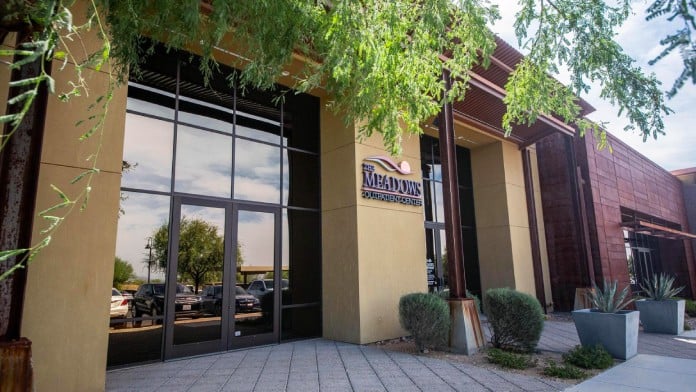
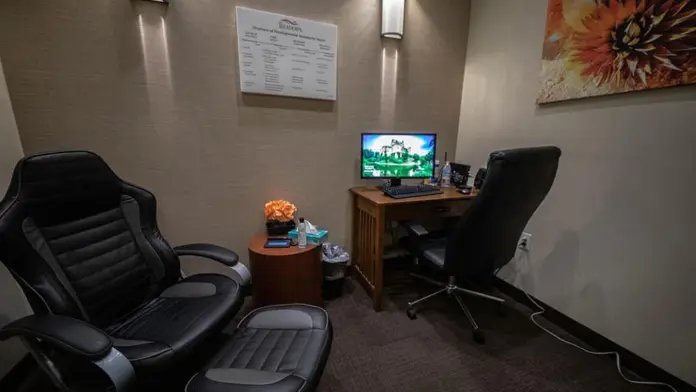
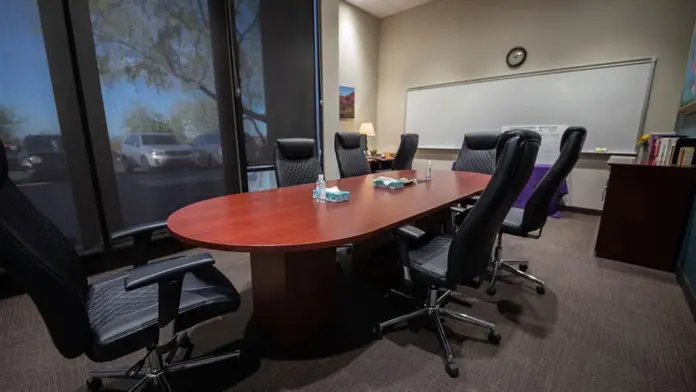
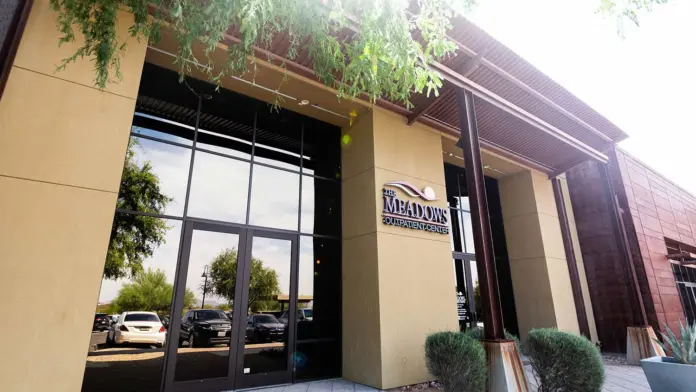
Location
Accepted Insurance
Other Forms of Payment
Private insurance refers to any kind of healthcare coverage that isn't from the state or federal government. This includes individual and family plans offered by an employer or purchased from the Insurance Marketplace. Every plan will have different requirements and out of pocket costs so be sure to get the full details before you start treatment.
Self-pay involves paying for treatment out of your own pocket. You can use savings or credit, get a personal loan, or receive help from family and friends to fund your treatment. If you don't have insurance or your insurance plan doesn't cover a specific program, self-pay can help ensure you still get the care you need.
Military members, veterans, and eligible dependents have access to specific insurance programs that help them get the care they need. TRICARE and VA insurance can help you access low cost or no cost addiction and mental health treatment. Programs that accept military insurance often have targeted treatment focused on the unique challenges military members, veterans, and their families face.
Addiction Treatments
Levels of Care
Treatments
The goal of treatment for alcoholism is abstinence. Those with poor social support, poor motivation, or psychiatric disorders tend to relapse within a few years of treatment. For these people, success is measured by longer periods of abstinence, reduced use of alcohol, better health, and improved social functioning. Recovery and Maintenance are usually based on 12 step programs and AA meetings.
Drug rehab in Arizona is the process of treating individuals who are dependent on a particular addictive drug. Because addiction is complex, this treatment typically includes a variety of interventions that address the many physical and emotional issues involved.
Many of those suffering from addiction also suffer from mental or emotional illnesses like schizophrenia, bipolar disorder, depression, or anxiety disorders. Rehab and other substance abuse facilities treating those with a dual diagnosis or co-occurring disorder administer psychiatric treatment to address the person's mental health issue in addition to drug and alcohol rehabilitation.
A combined mental health and substance abuse rehab has the staff and resources available to handle individuals with both mental health and substance abuse issues. It can be challenging to determine where a specific symptom stems from (a mental health issue or an issue related to substance abuse), so mental health and substance abuse professionals are helpful in detangling symptoms and keeping treatment on track.
Opioid rehabs specialize in supporting those recovering from opioid addiction. They treat those suffering from addiction to illegal opioids like heroin, as well as prescription drugs like oxycodone. These centers typically combine both physical as well as mental and emotional support to help stop addiction. Physical support often includes medical detox and subsequent medical support (including medication), and mental support includes in-depth therapy to address the underlying causes of addiction.
Programs


Clinical Services
Cognitive Behavioral Therapy (CBT) is a therapy modality that focuses on the relationship between one's thoughts, feelings, and behaviors. It is used to establish and allow for healthy responses to thoughts and feelings (instead of unhealthy responses, like using drugs or alcohol). CBT has been proven effective for recovering addicts of all kinds, and is used to strengthen a patient's own self-awareness and ability to self-regulate. CBT allows individuals to monitor their own emotional state, become more adept at communicating with others, and manage stress without needing to engage in substance abuse.
EMDR is a therapeutic modality originally developed to help process trauma. In an EMDR session, a patient is prompted to undergo eye movements that mimic those of REM sleep. This is accomplished by watching a therapist's finger move back and forth across, or following a bar of light. The goal is repetitive sets of eye movements that help the brain reprocess memory, which can significantly reduce the intensity of remembered traumatic incidents. Associated memories can heal simultaneously, leaving patients significantly calmer, more stable, and more emotionally relaxed.
Research clearly demonstrates that recovery is far more successful and sustainable when loved ones like family members participate in rehab and substance abuse treatment. Genetic factors may be at play when it comes to drug and alcohol addiction, as well as mental health issues. Family dynamics often play a critical role in addiction triggers, and if properly educated, family members can be a strong source of support when it comes to rehabilitation.
Group therapy is any therapeutic work that happens in a group (not one-on-one). There are a number of different group therapy modalities, including support groups, experiential therapy, psycho-education, and more. Group therapy involves treatment as well as processing interaction between group members.
Amenities
-
Residential Setting
-
Private Setting
-
Mountain Views
-
Yoga Studio
-
Private Transportation
Accreditations

The Joint Commission, formerly known as JCAHO, is a nonprofit organization that accredits rehab organizations and programs. Founded in 1951, the Joint Commision's mission is to improve the quality of patient care and demonstrating the quality of patient care.
Joint Commission Accreditation: Yes
Accreditation Number: 1709
Contact Information
19120 N. Pima Rd.
Suite 125
Scottsdale, AZ 85255







